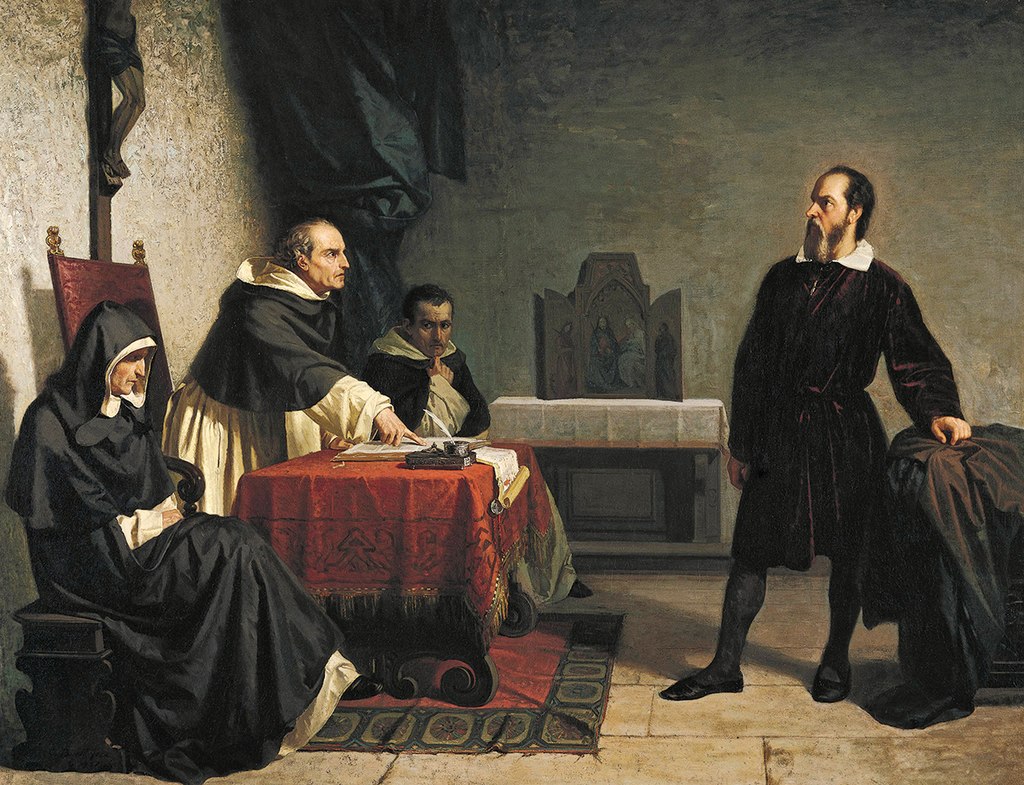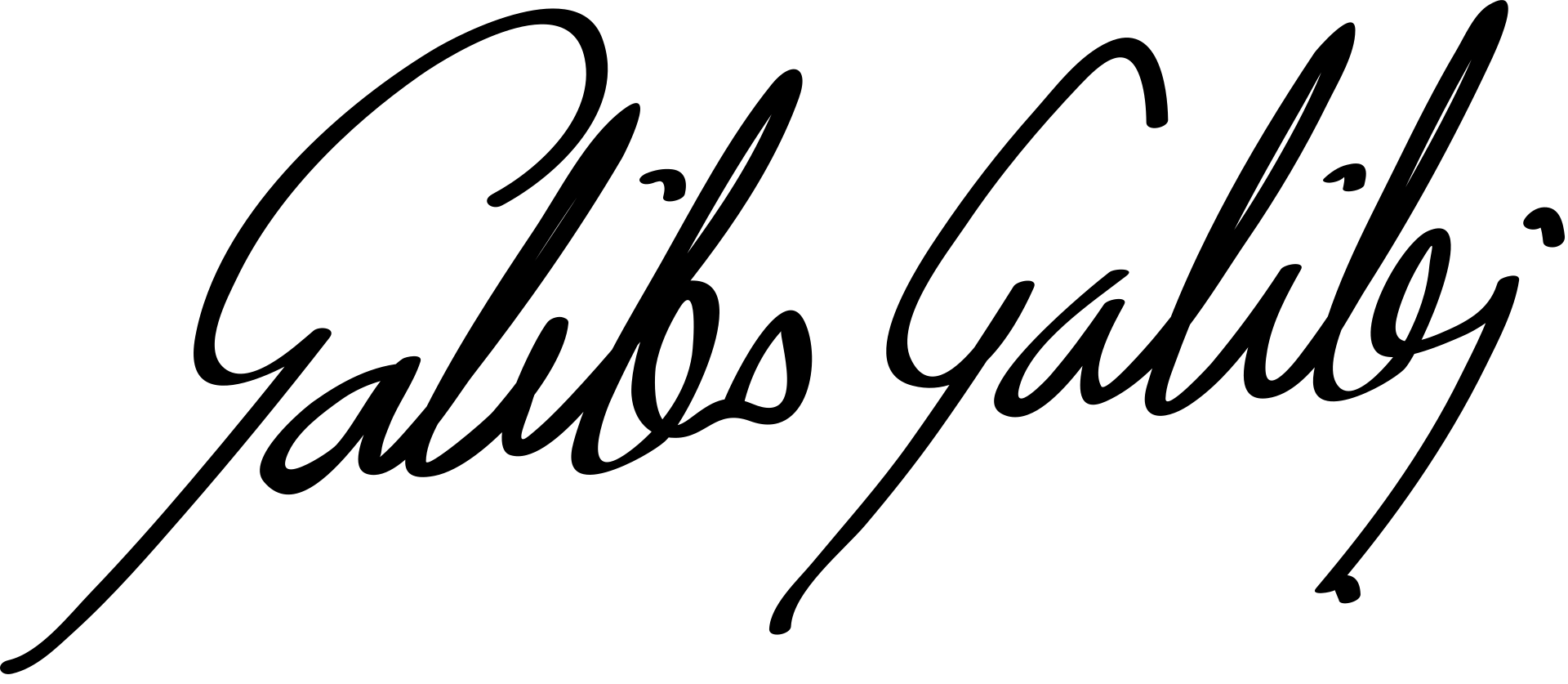
Galileo faces the Roman Inquisition
By Cristiano Banti – http://www.law.umkc.edu/faculty/projects/ftrials/galileo/galileotrial.jpghttps://www.newscientist.com/article/mg22530043-300-popes-impending-call-for-climate-action-is-refreshing/ image, Public Domain, https://commons.wikimedia.org/w/index.php?curid=631170
Back in the old days when I was plodding through the AFA’s demanding astrology course, I remember my disappointment when I learned that my first thesis delineation was to be on Galileo. Please understand that I had nothing personal against this great scientific giant but, what more could be unearthed about a man whose name echoes in the annals of science and whose persona fills a spot in every grammar school science text book? It seemed to me that his story was well told and understood by most so why waste time when there were so many delicious and famous and scandalous personalities out there! Alas, my most convincing argument would not change the mind of my teacher…the rules were the rules! Antonio Banderas was out and Galileo Galilei was in.
Many people have a tendency to confuse astrologers with fortune tellers. The truth be known, any astrologer who has undergone professional astrological schooling knows that the first rule of astro-counseling 101 is to understand as much about an individual’s background as possible. Any volunteered information can be validated by the natal chart and life cycle observation unless the client has decided to engage in a round of “Stump The Astrologer” which does occur every now and then. The psychology of these people is most interesting because they not only take skepticism to a new level but waste everyone’s time including their own. From what I know of his “background check”, Galileo the mathematician and scientist, probably would have enjoyed a round of Stump The Astrologer even though he practiced astrology as did most great minds of his day. I doubt if he would have spent much time on the game since his head was so wrapped around his “science” and illicit love affair. I was soon to find out that the life of Galileo Galilei would rival any modern day
Yes, it is true that Galileo was “admittedly” a lousy astrologer or maybe he just didn’t have his heart in it. Among his personal effects, an astrological chart he cast for his oldest child was discovered. Astrological historians claim that the delineation of this horoscope didn’t seem to cast much light on the personality or future of the child. Galileo had three illegitimate children, Virginia, Livia, and Vincenzio who were the product of a long affair he had with his housekeeper Marina Gamba. Parental responsibility was quite different in Galileo’s era and even though he cared greatly for his children, he chose not to marry
Galileo grabbed life by the forelock and lived it despite the fact that for a good part of his existence, local authorities and the Church did their best to prevent this. Galileo’s dispute with the Catholic Church regarding our Sun centered solar system is well known. It colored the outcome of a trial that would sentence him to “house arrest” for the duration of his life. His last days were characterized by ill health and rapidly failing eyesight yet he kept on with his work with the help of a few assistants who acted as his eyes. I must admit…after my background research of Galileo was completed I was left with a brand new respect for the man!
In Galileo’s day, it was expected that an astronomer, scientist, or even doctor be well versed in astrology. If employed by the royal court or the aristocracy, anyone in these professions would be expected to supply a horoscope upon demand. In fact, astrology was a rather lucrative business back then. Galileo knew he could (and did) count on it to put food on the table. So did the other well known astronomers of that era, Tycho Brahe and Johannes Kepler. This moved me to curiosity about other famous people throughout history who either practiced or supported astrology openly but may not be known today for their convictions. Further cross referencing and research yielded some surprises…
ST. THOMAS AQUINAS: The Italian philosopher and theologian whose prolific writings and works make him one of the most respected and important figures in Scholastic philosophy and one of the most prominent Roman Catholic theologians, spent a good part of his life trying to reconcile astrology with Biblical teachings. He is quoted as follows, “The celestial bodies are the cause of all that takes place in the sublunar world.”
HIPPOCRATES: The most revered name in medicine and known as the ‘Father of Medicine’ is quoted as follows: “A physician without a knowledge of Astrology has no right to call himself a physician.”
WILLIAM SHAKESPEARE: The supreme English playwright, poet, and dramatist is believed to have had a thorough knowledge of astrology which is evidenced in his allusions to the science. In an example from King Lear, the King says: “The stars above govern our condition.” To this, another character retorts, “I was born, sir, when the Crab was ascending: all my affairs go backwards.” (The astrologers and astro-buffs in our audience should enjoy that bit of humor!)
MARK TWAIN: The supreme American writer, humorist, wit, and lecturer said, “I was born with Halley’s Comet, and I expect to die upon its return.” Guess what? He did.
BENJAMIN FRANKLIN: American Revolutionist, author, printer, philosopher, diplomat, and scientist named his famous Poor Richard’s Almanack after an astrologer/physician.
THEODORE ROOSEVELT: Before his illustrious political career, “Teddy” had his first horoscope cast when he was just ten years old. Later, the horoscope was mounted on a chess board which stood on a table in his room at the White House. Referring to his Horoscope he quipped, “I always keep my weather-eye on the opposition of my Seventh House Moon to my First House Mars.”
CARL GUSTAV JUNG: The great Swiss psychiatrist who founded the analytical school of psychology and is well known for his work regarding “archetypes” and the “collective unconscious” said, “…astrology represents the summation of all the psychological knowledge of antiquity.”
SIR ISAAC NEWTON: The noted English mathematician and physicist upon his entrance to Cambridge said he wanted to study, “Mathematics-because I wish to test Judicial Astrology.”** When teased by astronomer Halley for his belief in astrology
Other great minds or notables who have either studied or respected astrology that may tickle your senses further are, Goethe, Dante, William Butler Yeats, Ralph Waldo Emerson, Chaucer, Leonardo da Vinci, Popes Sixtus IV, Julius II, Paul III, Henry Miller, Queen Elizabeth I, Confucius, John Ruskin, John Burroughs, Sir Walter Scott, Sir Francis Bacon, and John Milton.
In our current life and times we have grown more or less shock proof thanks to the disclosures of the media. When former First Lady Nancy Reagan sought out the services of a professional astrologer during the Reagan Administration, it barely caused a public ripple. Our celebrities are relatively open about their spiritual beliefs and use of astrology. For the most part, today’s astrologers are highly intelligent and well educated people. Some hold high degrees in psychology, astronomy, mathematics, and theology and incorporate this knowledge into their astrological practices. It makes one wonder about how Galileo would have felt about the contemporary astrological scene. Even if he didn’t approve, he could still find some solace in our technological advances born of what was known in his day as “that new fangled thing called science.” Still, I think he would find today’s new astrology hard to ignore!

By Galileo Galilei – http://asv.vatican.va/immagini/doc/1616_b.jpg, Public Domain, https://commons.wikimedia.org/w/index.php?curid=10278133
*Electional Astrology is a method used for choosing the best time to initiate an event such as a wedding, elective surgery, setting up a business, or even taking a vacation!
**Judicial Astrology concerns national or worldly events and can be used to view propensity for war, political upheaval, or the economic prosperity or decline of any nation.
All quotes of the famous historical supporters of astrology in this article were taken from DeVore’s Encyclopedia of Astrology.